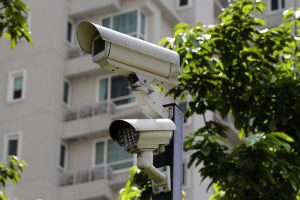 High foot-traffic in apartment complexes increases the risk of intrusion and crime. As such, renters need to take particular precautions in selecting and securing their homes.
High foot-traffic in apartment complexes increases the risk of intrusion and crime. As such, renters need to take particular precautions in selecting and securing their homes.
Safewise offers tips to renters on securing apartments against robbery home invasions:
Be Aware of Your Surroundings
No matter where you live, you need to keep an eye on what’s going on around you. This means taking note of your neighbors and the friends they keep. Both before you move into a new area, and periodically throughout living in any neighborhood, it’s a good idea to check local crime reports and the National Sex Offender Registry to see who is living near you.
You can’t control everyone who walks by your home, but you can be observant. By getting to know your neighbors, as well as apartment management if that’s where you live, you’ll have an easier time identifying someone who shouldn’t be there. If you notice someone who you don’t recognize working on an apartment in your building, call your building management or 911.
Get to Know Your Neighbors
By the very nature of apartment living, your home is part of a community and your neighbors are essential. In apartment complexes, word can spread fast, loud or unusual noises are likely heard by many, and where there are more potential witnesses for anything that happens. While the space between houses may make hearing suspicious noises or seeing strange activity more challenging, neighbors are also important in single family home scenarios. You’ll likely feel more secure having an extra set of eyes keeping watch in the neighborhood.
Secure Your Doors and Windows
Many apartment dwellers may think their front door is the only place that needs to be secured, but that’s not true. Even if you’re living on the fifth story of an apartment building and have a window, especially one that is accessible from a fire escape, it is important to secure all possible points of entry into your residence.
While it’s always important to lock all doors and windows, you can take your door and window security a step further by installing additional hardware. If you have a sliding door, place a solid safety bar made of metal that will help prevent the door from opening. You can also install jimmy plates that will help prevent the sliding door from being lifted off its track. With windows, there are several second locks you can easily install to help make them more secure.
Security Systems
Many of the same security options available to homeowners are available to apartment renters. You can use cameras, motion detectors, and wireless security systems that don’t require drilling holes that might void a deposit.
Security Checklist Before Moving In
- Make sure your doors and windows all open and shut smoothly and lock tight without effort. You want all the locks functioning smoothly, as this should never be a difficult task.
- Ensure your landlord or property manager replaced the locks after the previous tenants moved out. If they didn’t, require this gets done. You never know who has a copy of your keys.
- If you’re moving into an apartment building, check all exterior doors or windows that lead to common space in the building and make they’re secure. Once a potential burglar is in the building, they are one door away from your possessions.
- Talk to other residents and ask them about their experiences in the neighborhood or building. If they all feel safe, you likely can too. If they all raise the same concern, consider it a red flag.
- Regularly check everything: your own locks, how the exterior doors shut, if lights in hallways and alleys work, etc.
See full report here.
We Fight for Victims of Apartment Security Negligence in Georgia…Contact us Now for a Free Consultation.
 The Murray Law Firm has recovered millions of dollars for victims of unsafe properties in Georgia, and recently obtained a $29.25 million dollar verdict for one of our Clients in Fulton County State Court.
The Murray Law Firm has recovered millions of dollars for victims of unsafe properties in Georgia, and recently obtained a $29.25 million dollar verdict for one of our Clients in Fulton County State Court.
We represent our Clients on a contingency agreement, which generally means that no fees or payments are owed until and unless we recover. Anyone seeking further information or legal representation is encouraged to contact us at 888.842.1616. Consultations are free and confidential.

Choosing the Right Attorney
Selecting the right attorney for you or your family is highly important. You must feel confident that the attorney you hire has a complete understanding of the law applicable to your particular case, and has successful experience in handling such cases.
Important: Do not hire a lawyer who has violated the Rules of Professional Conduct!!!
You should not hire an attorney who calls you or visits you unsolicited, or anyone that contacts you directly to offer legal services. This activity is strictly prohibited by Rule 7.3 of the American Bar Association (ABA) Model Rules of Professional Conduct, which states as follows:
 A LAWYER “SHALL NOT” CONTACT A PROSPECTIVE CLIENT THROUGH A “LIVE TELEPHONE” OR AN “IN-PERSON” VISIT.
A LAWYER “SHALL NOT” CONTACT A PROSPECTIVE CLIENT THROUGH A “LIVE TELEPHONE” OR AN “IN-PERSON” VISIT.
– RULE 7.3, ABA MODEL RULES OF PROFESSIONAL CONDUCT.
If an attorney, or someone acting on behalf of an attorney, contacts you in this manner, that attorney is in violation of this Rule. This unethical and unprofessional activity on the part of the lawyer is good sign that you should stay away. It is imperative that you are represented by an attorney who is capable of advocating for you within the confines of the law, and an attorney who fails to abide by the Rules of Professional Conduct is probably not the best fit. In fact, any such attorney should be immediately reported to the local State Bar Association. If you have been contacted in such an unsolicited manner, contact us and we’ll assist you in filing a report.

Contingency Fees Disclaimer: “Contingent attorneys’ fees refers only to those fees charged by attorneys for their legal services. Such fees are not permitted in all types of cases. Court costs and other additional expenses of legal action usually must be paid by the client.”
 SPD Urges Community Crime Watch for Apartment and Condo Residents
SPD Urges Community Crime Watch for Apartment and Condo Residents Georgia Legal Report
Georgia Legal Report


 Apartment complex living opens residents up to a host of security risks due to their close proximity to multiple tenants and a lack of complete control over visitor access to the property. As such, apartment complex owners have a legal responsibility to protect residents and guests from any foreseeable harm.
Apartment complex living opens residents up to a host of security risks due to their close proximity to multiple tenants and a lack of complete control over visitor access to the property. As such, apartment complex owners have a legal responsibility to protect residents and guests from any foreseeable harm. The Murray Law Firm has recovered millions of dollars for victims of unsafe properties in Georgia, and recently obtained a $29.25 million dollar verdict for one of our Clients in Fulton County State Court.
The Murray Law Firm has recovered millions of dollars for victims of unsafe properties in Georgia, and recently obtained a $29.25 million dollar verdict for one of our Clients in Fulton County State Court.

